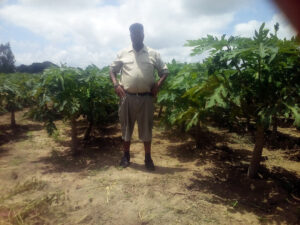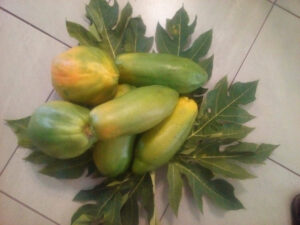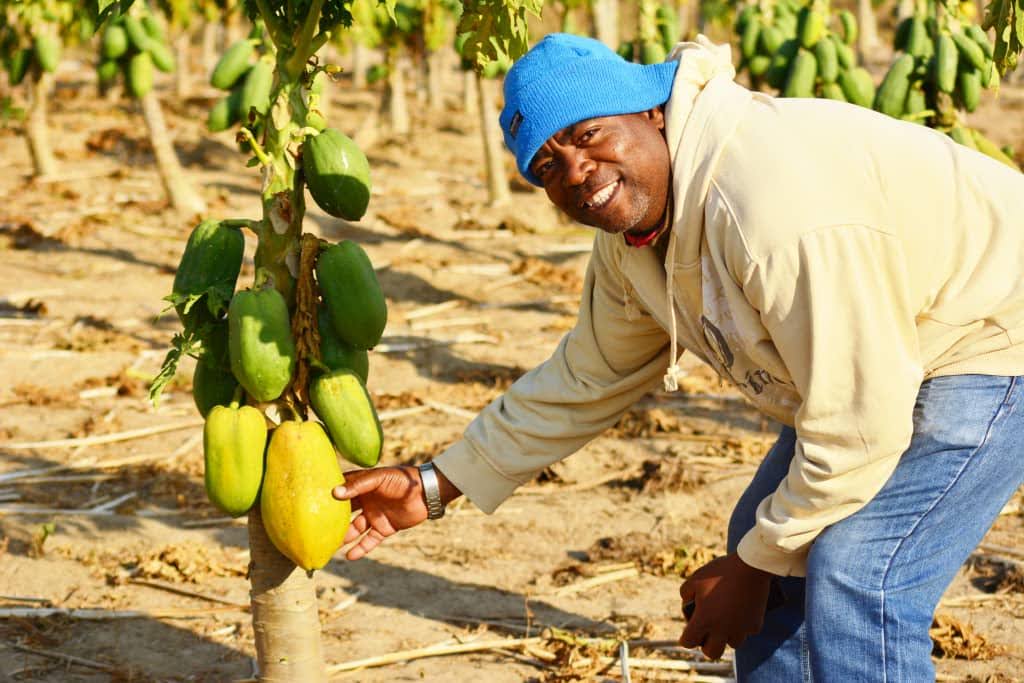Arthur Garande: Agripreneur and Educator
A seasoned educator and passionate farmer realising the benefits of investing in rural Zimbabwe.
Tell us about yourself and how you started your journey in farming?
I am a high school teacher in Harare who has seen great opportunities for farming in rural Zimbabwe. I started planning my farming journey in 2017 because of layman’s market research. While waiting in the parking lot at my daughter’s school a fruit vendor tried to sell me papaya at $6 for a punnet that would barely exceed 1kg which seemed overpriced. This led me to actively look for papaya at Mbare and in the supermarkets. I made two observations, one, when available the papaya was expensive but overall, it was hard to find in the market. A little online research revealed that elsewhere in the world people have plantations where they grow papayas. Further research led to finding the many varieties of the same and their benefits. I then remembered that we once had three plants at our home as a youth and so I decided to grow some.
The next challenge was to negotiate with my family about the land. The first person to converse with was my wife who started off as my biggest critic but has turned out to be my biggest supporter, sometimes even challenging me to set higher goals than I believe are possible. Next to be engaged was my mother and siblings for the use of a small portion of land that would ordinarily be used for maize. Being a portion that is secure, this would be where the earliest maize crop would go so it was a long conversation but eventually, they agreed. When these conversations were sealed the journey began. I bought seeds, nursed them at the back of my house and then transported them to the rural farm and planted them on what would be prime family land.
I launched out starting with growing pawpaws but many more possibilities later opened up. Last year we grew papaya which we continue to grow. One of the big attractions with papaya for me was the high yield and return on investment. This in turn led to generally working with figures when deciding which crop to grow. In the 2020-2021 growing season our crops included sweet potato which we intercropped with the papaya. As the norm for almost all rural households, maize and peanuts continue to be part of our household. This year we are also planning to try out some winter crops since we now have a good irrigation system in place.
We have drilled a borehole on-site for supplementary irrigation and now that we have invested so much, we are increasing efficiency by intercropping. This will be our model going forward. The secret to successful farming is water and fencing so we plan to fence off more and more of the land available and drill an additional borehole to ensure we can keep expanding.
What are some of the challenges you have faced in your journey since starting?
After planting I faced so many criticisms from people who basically “knew” that there is no market for such a huge quantity of fruit. Sadly, the first year was not as successful as had been projected because 2018-2019 was a drought year and the winter did not help. The following season (2019-2020) was looking good and there we had a bumper harvest, but Covid-19 restrictions meant that marketing logistics required us to beat lockdown and curfew to get the product to the market. For market penetration during the lockdown, we used social media and it was not easy. Still, the returns made it possible to reinvest. The logistical challenges led to exploring value-addition through drying. It turns out dried papaya also has a huge potential on the local market. We are still exploring other areas for value addition such as jams, juices, teas, and other pharmaceutical products.
Another challenge which we thought we had solved by replacing barbed wire fence with diamond mesh wire was that of thieves. Biosecurity is an issue we had thought of but not yet pursued. Sadly, during harvest, we found a well-trodden path into the field and upon following the path we saw that someone had actually opened a hole in the fence which they were using regularly to access our farm areas. Theft from neighbours remains one of the serious challenges for rural farming, especially for high-value crops like papaya or indeed any other fruits. As such, we continue to look for ways to tighten security.


What are some of the key lessons learnt along the way?
I have learnt many lessons on the journey so far one being that farming requires knowledge. In the case of fruit production, you need information on varieties, suitability of soils and climate as well as pest and disease management and post-harvest processing. I learnt all these on the go which was very exciting. Having access to the internet and to various forums, I have also decided to be at the forefront to try out different fruit species and when I succeed, I lead others into it.
Another lesson is to treat farming as a business and thus do the necessary planning, growing and marketing using best practices. I have openly shared my experiences and this has led to one of the organisations I am part of, ZBIN (Zimbabwe Business Ideas Network), recognising me as a farmer of the year 2019-2020. I cannot quantify these but I have inspired many people with access to rural land to consider using it for commercial purposes rather than leaving it idle as was the case with many.
Capital is often cited as a challenge for most ventures. We started our venture with the minimal capital outlay and along the way discovered there was a need for a proper investment. Though we made some good returns, re-investing needed significant capital injection. But now, with a track record, it is easier to mobilise funds to improve an already successful operation.
What is the big picture, where to from here?
My plan is to populate all available fields with fruit trees. This is in the wake of realising that Zimbabwe imports the bulk of the fruit on its supermarket shelves, yet our land and climate are quite suitable for growing them locally. My aspiration is to help Zimbabwe in import substitution by growing as much fruit locally as we can. Already there are many who are venturing into it because of having contacted me and that is satisfying.
By profession, I am a teacher and my journey in agripreneurship has been a good mix of both teaching and learning. I was warned about divulging too much information before I have made the money but for me the fun is precisely in sharing that information and those experiences.
Growing papaya has opened my thinking to the general questions of conservation so at my school I have started a Club for students where we plant trees and learn about the various indigenous species. We hope to distribute seedlings as widely as possible to raise awareness as well as to restore and conserve indigenous tree species.
Define yourself in one/two sentences
I am a man who has had the privilege of various restarts in terms of life values and outlook. Upon starting out in fruit production in this way, I feel I am at the beginning of another re-launch as a person. In many respects this is the most exciting to date. I am a spiritual person who believes in a God who is active in human lives and I am to be available to be used by that God.
Any special message/word of encouragement to the readers?
In my spiritual journey, I have learnt that fears and procrastination can kill ideas before they are even born. The secret is to begin and correct as you go. Any pre-planning if done is a bonus. Do not let your fears stop you from starting. Also, many people advise you to keep your plans to yourself until they have succeeded. I disagree. I believe in letting others know your plans so they will correct you if you are mistaken about one or two aspects and also, so you have someone to compare notes with should they decide to copy.
Connect with Arthur
Facebook: papayazimbabwe
LinkedIn: Arthur Garande
Email: agarande@gmail.com
WhatsApp:+263 772 698 790





